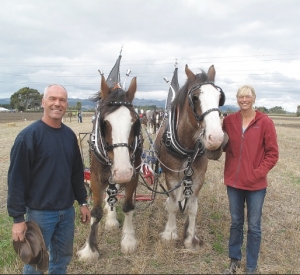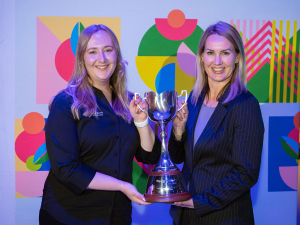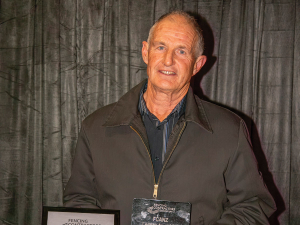They qualified for the New Zealand championships at Lincoln last year.
“We did not do so well, but we qualified,” Margo told Rural News. “We learnt a lot and had a lot of fun competing as a team with our Clydesdales Viking and Lucky.” With more competitions the Vliet Vlielands believe they are improving.
The Vliet Vlielands first came to New Zealand in 1992 to have a look and settled a year later. He is a qualified aircraft mechanic, she an office manager. He was head-hunted by Air New Zealand so they settled in Christchurch and one year after arriving bought 4.5ha at West Eyreton where they still live.
“We came to New Zealand for an environment where we could have some space and be able to buy some land which was impossible back home,” Alan explains.
Margo wanted a horse – something she could not have in Holland. There owning a horse was the preserve of the “rich and famous”. Alan had learnt to ride as a small boy, when his mother took him to lessons at a riding school.
Margo’s first horse was a standard bred but after her first sight of a Clydesdale at the Canterbury A&P Show she said, “My next horse will be one of those with fluffy feet.”
When the standard bred died 18 months later, they bought their first Clydesdale colt. Eleven years later they now have 11 head and breed, train, sell and show the horses at Canterbury shows, and use them for ploughing.
“Clydesdales are still classed as a rare breed,” Margo says, and she believes they are unrecognised for their part in New Zealand’s history before tractors.
When one of their horses had teeth trouble they had to use the services of a local horse dentist.
Horses’ teeth grow all the time – the expression “long in the tooth” originally referred to horses – so they have to be rasped down often.
Seeing the dentist at work aroused Alan’s interest and in 2003 he went to Virginia in the US and did a four month training course.
“When I returned I was doing both jobs (Air NZ engineer) for a while, but seven years ago I became a full-time horse dentist.”
With the slogan ‘Great and small we do them all’, he has worked on every type of horse – including top pacer Monkey King, donkeys and miniature show ponies.
“The horses I treat improve their eating and with some remedial work they can steer better.”
His horse dentistry work is mainly in Canterbury, but he travels as far as Oamaru in the south and Blenheim in the north.
“It is a nice job removing pain and discomfort. I get job satisfaction and I get paid; what else do you need?”.
Alan prides himself that 95% of his work is done without sedating the ‘patients’ and he has all the work he can cope with.









